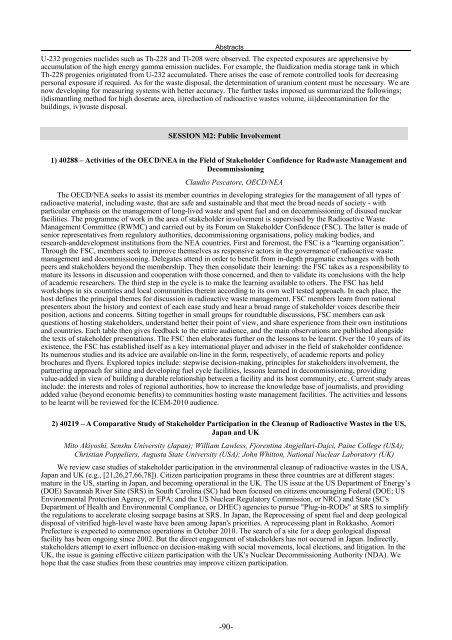ASME Message
ASME Message
ASME Message
Create successful ePaper yourself
Turn your PDF publications into a flip-book with our unique Google optimized e-Paper software.
Abstracts<br />
U-232 progenies nuclides such as Th-228 and Tl-208 were observed. The expected exposures are apprehensive by<br />
accumulation of the high energy gamma emission nuclides. For example, the fluidization media storage tank in which<br />
Th-228 progenies originated from U-232 accumulated. There arises the case of remote controlled tools for decreasing<br />
personal exposure if required. As for the waste disposal, the determination of uranium content must be necessary. We are<br />
now developing for measuring systems with better accuracy. The further tasks imposed us summarized the followings;<br />
i)dismantling method for high doserate area, ii)reduction of radioactive wastes volume, iii)decontamination for the<br />
buildings, iv)waste disposal.<br />
SESSION M2: Public Involvement<br />
1) 40288 – Activities of the OECD/NEA in the Field of Stakeholder Confidence for Radwaste Management and<br />
Decommissioning<br />
Claudio Pescatore, OECD/NEA<br />
The OECD/NEA seeks to assist its member countries in developing strategies for the management of all types of<br />
radioactive material, including waste, that are safe and sustainable and that meet the broad needs of society - with<br />
particular emphasis on the management of long-lived waste and spent fuel and on decommissioning of disused nuclear<br />
facilities. The programme of work in the area of stakeholder involvement is supervised by the Radioactive Waste<br />
Management Committee (RWMC) and carried out by its Forum on Stakeholder Confidence (FSC). The latter is made of<br />
senior representatives from regulatory authorities, decommissioning organisations, policy making bodies, and<br />
research-anddevelopment institutions from the NEA countries. First and foremost, the FSC is a “learning organisation”.<br />
Through the FSC, members seek to improve themselves as responsive actors in the governance of radioactive waste<br />
management and decommissioning. Delegates attend in order to benefit from in-depth pragmatic exchanges with both<br />
peers and stakeholders beyond the membership. They then consolidate their learning: the FSC takes as a responsibility to<br />
mature its lessons in discussion and cooperation with those concerned, and then to validate its conclusions with the help<br />
of academic researchers. The third step in the cycle is to make the learning available to others. The FSC has held<br />
workshops in six countries and local communities therein according to its own well tested approach. In each place, the<br />
host defines the principal themes for discussion in radioactive waste management. FSC members learn from national<br />
presenters about the history and context of each case study and hear a broad range of stakeholder voices describe their<br />
position, actions and concerns. Sitting together in small groups for roundtable discussions, FSC members can ask<br />
questions of hosting stakeholders, understand better their point of view, and share experience from their own institutions<br />
and countries. Each table then gives feedback to the entire audience, and the main observations are published alongside<br />
the texts of stakeholder presentations. The FSC then elaborates further on the lessons to be learnt. Over the 10 years of its<br />
existence, the FSC has established itself as a key international player and adviser in the field of stakeholder confidence.<br />
Its numerous studies and its advice are available on-line in the form, respectively, of academic reports and policy<br />
brochures and flyers. Explored topics include: stepwise decision-making, principles for stakeholders involvement, the<br />
partnering approach for siting and developing fuel cycle facilities, lessons learned in decommissioning, providing<br />
value-added in view of building a durable relationship between a facility and its host community, etc. Current study areas<br />
include: the interests and roles of regional authorities, how to increase the knowledge base of journalists, and providing<br />
added value (beyond economic benefits) to communities hosting waste management facilities. The activities and lessons<br />
to be learnt will be reviewed for the ICEM-2010 audience.<br />
2) 40219 – A Comparative Study of Stakeholder Participation in the Cleanup of Radioactive Wastes in the US,<br />
Japan and UK<br />
Mito Akiyoshi, Senshu University (Japan); William Lawless, Fjorentina Angjellari-Dajci, Paine College (USA);<br />
Christian Poppeliers, Augusta State University (USA); John Whitton, National Nuclear Laboratory (UK)<br />
We review case studies of stakeholder participation in the environmental cleanup of radioactive wastes in the USA,<br />
Japan and UK (e.g., [21,26,27,66,78]). Citizen participation programs in these three countries are at different stages:<br />
mature in the US, starting in Japan, and becoming operational in the UK. The US issue at the US Department of Energy’s<br />
(DOE) Savannah River Site (SRS) in South Carolina (SC) had been focused on citizens encouraging Federal (DOE; US<br />
Environmental Protection Agency, or EPA; and the US Nuclear Regulatory Commission, or NRC) and State (SC's<br />
Department of Health and Environmental Compliance, or DHEC) agencies to pursue "Plug-in-RODs" at SRS to simplify<br />
the regulations to accelerate closing seepage basins at SRS. In Japan, the Reprocessing of spent fuel and deep geological<br />
disposal of vitrified high-level waste have been among Japan's priorities. A reprocessing plant in Rokkasho, Aomori<br />
Prefecture is expected to commence operations in October 2010. The search of a site for a deep geological disposal<br />
facility has been ongoing since 2002. But the direct engagement of stakeholders has not occurred in Japan. Indirectly,<br />
stakeholders attempt to exert influence on decision-making with social movements, local elections, and litigation. In the<br />
UK, the issue is gaining effective citizen participation with the UK's Nuclear Decommissioning Authority (NDA). We<br />
hope that the case studies from these countries may improve citizen participation.<br />
-90-


